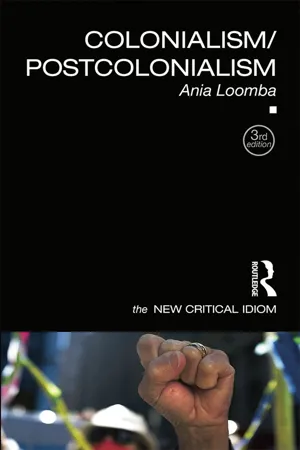
- 304 pages
- English
- ePUB (mobile friendly)
- Available on iOS & Android
Colonialism/Postcolonialism
About this book
Colonialism/Postcolonialism is a comprehensive yet accessible guide to the historical, theoretical and political dimensions of colonial and postcolonial studies.
This new edition includes a new introduction and conclusion as well as extensive updates throughout. Topics covered include globalization, new grassroots movements (including Occupy Wall Street), the environmental crisis, and the relationship between Marxism and postcolonial studies. Loomba also discusses how ongoing struggles such as those of indigenous peoples, and the enclosure of the commons in different parts of the world shed light on the long histories of colonialism. This edition also has extensive discussions of temporality, and the relationship between premodern, colonial and contemporary forms of racism. This books includes:
- key features of the ideologies and history of colonialism
- the relationship of colonial discourse to literature
- anticolonial thought and movements
- challenges to colonialism, including anticolonial discourses
- recent developments in postcolonial theories and histories
- issues of sexuality and colonialism, and the intersection of feminist and postcolonial thought
- the relationship of activist struggles and scholarship.
Colonialism/Postcolonialism is the essential introduction to a vibrant and politically charged area of literary and cultural study. It is the ideal guide for students new to colonial discourse theory, postcolonial studies or postcolonial theory as well as a reference for advanced students and teachers.
Tools to learn more effectively

Saving Books

Keyword Search

Annotating Text

Listen to it instead
Information
INDEX
- Abu-Lughod, J. 22
- accumulation 255–58
- Accumulation of Capital, The (Luxemberg) 255–56
- Achebe, C. 94, 100–101, 141
- Adas, M. 22
- administrative colonialism 23–24
- Adorno, T. 63
- Afghanistan, American aggression toward 6, 8, 204
- Africa, Africans:
- blackness 76, 83, 94–95, 113, 114, 117, 120–23, 124, 128, 205, 207, 258
- colonial medical discourse 68–69, 143–46
- colonial processes in 24, 25, 29, 36, 64, 133
- creation of tradition 70
- diaspora 174, 207–8
- differences from Europe 12
- histories of 208, 237, 238, 245
- indigenous dispossession 253, 258
- language debates 100–101
- literature 11, 100–102
- nationalism 32, 185, 188, 191–92, 198, 208
- pan-nationalism 205–7; see also Negritude
- postcoloniality 241–42
- racist stereotypes 106, 114, 115, 119
- religious conflict 113, 121
- representations in Western science 77, 124, 161–62; see also colonial medical discourse representations of 42, 72, 141, 143–44, 153–54, 157, 241
- science 76
- tribal groupings 105–6, 130
- women 7...
Table of contents
- Cover
- Half Title Page
- Title Page
- Copyright Page
- Dedication
- Table of Contents
- Series editor’s preface
- Introduction
- Situating colonial and postcolonial studies
- Colonial and postcolonial identities
- Colonial and postcolonial identities
- Conclusion: The future of postcolonial studies
- Bibliography
- Index
Frequently asked questions
- Essential is ideal for learners and professionals who enjoy exploring a wide range of subjects. Access the Essential Library with 800,000+ trusted titles and best-sellers across business, personal growth, and the humanities. Includes unlimited reading time and Standard Read Aloud voice.
- Complete: Perfect for advanced learners and researchers needing full, unrestricted access. Unlock 1.4M+ books across hundreds of subjects, including academic and specialized titles. The Complete Plan also includes advanced features like Premium Read Aloud and Research Assistant.
Please note we cannot support devices running on iOS 13 and Android 7 or earlier. Learn more about using the app